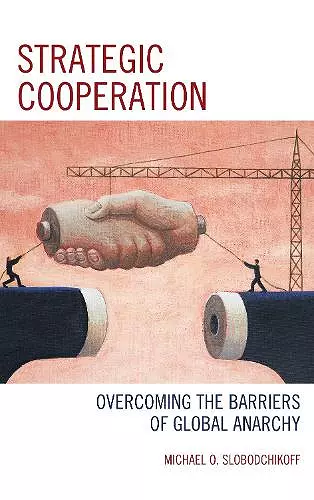Strategic Cooperation
Overcoming the Barriers of Global Anarchy
Michael O Slobodchikoff author
Format:Hardback
Publisher:Lexington Books
Published:18th Apr '13
Currently unavailable, and unfortunately no date known when it will be back

Power inequalities and mistrust have characterized many interstate relationships. Yet most international relations theories do not take into account power and mistrust when explaining cooperation. While some scholars argue that power relations inhibit cooperation between states, other scholars expect interstate cooperation regardless of the power relations and level of trust. Strategic Cooperation: Overcoming the Barriers of Global Anarchy argues that although states benefit from cooperation, they are also wary of the power relations between states, making cooperation difficult. Successful and cooperative bilateral relationships are formed between strong and weak states that are power asymmetric and have mistrust of one another, but they are built in such as way as to overcome the problem of power asymmetry and mistrust. This book answers how and why states that are in power asymmetry and have mistrust of one another are able to build a cooperative bilateral relationship. It argues that states forge a relationship due to strategic needs such as economic or security needs. Slobodchikoff has developed a database composed of the whole population of bilateral treaties between Russia and each of the former Soviet republics, and examines all of these bilateral relationships. He finds that Russia indeed forged relationships with the former republics based on its strategic interests. However, despite Russia's strategic interests, it had to build a bilateral relationship that would address the issues of mistrust and power asymmetry between the states. To achieve this, Russia and the former Soviet republics created treaty networks, which served to legitimize as well as legalize the independent status of each of the former republics while also increasing the cost to Russia of violating any of the treaties. This book argues that strong treaty networks account for a more cooperative relationship between states, allowing both states to cooperate by alleviating the problems of mistrust and power asymmetry.
This book is a valuable study because Michael Slobodchikoff analyses the region from a particular perspective. . . .The structure of the book is clear and well organised. The author provides a convincing and original explanation for bilateral relations in the former Soviet space by putting treaties and treaty nesting at the centre of the analysis. * Europe-Asia Studies *
[This] book offers a theoretically innovative approach to understanding international cooperation in the post-Soviet Eurasia. * International Studies Review *
Michael Slobodchikoff’s innovative study illuminates important ways by which treaty construction and networks enable states to advance their foreign policy, economic, and security interests. With a focus on Russia’s relations with former Soviet Union states such as Ukraine, Kazakhstan, and Belarus, this volume offers careful and timely analyses relevant to Putin period Eurasian politics. Relying on a combination of systematic analyses and focused case studies of inter-state treaty construction, this book enables readers to assess the differing opportunities and constraints that influence both a great power and less powerful states as they engage one another. Strategic Cooperation challenges the assumption that Russia is merely a coercive regional power that can unilaterally realize its ends without constraint. In fact, smaller countries have means by which they can safeguard, and even advance, their agendas, and in fact they are often quite energetic in doing so. Treaty networks, constructed over time, have structured and channeled the intersecting interests of both Russia and its less powerful (but diplomatically active) neighbors. Slobodchikoff’s volume shows the utility for all states, powerful and not, to engage in strategic cooperation that is more long-term and nuanced in its approach, with the real possibility for all states in a region to achieve many of their interconnected strategic goals. -- John P. Willerton, Professor of Political Science, University of Arizona
Anyone interested in international cooperation and post-Soviet Eurasia should read this book. The nested treaties approach is both original and productive for explaining how states expand their relations even when the resource of trust is not in place. -- Andrei P. Tsygankov, San Francisco State University
ISBN: 9780739178805
Dimensions: 236mm x 159mm x 18mm
Weight: 376g
170 pages